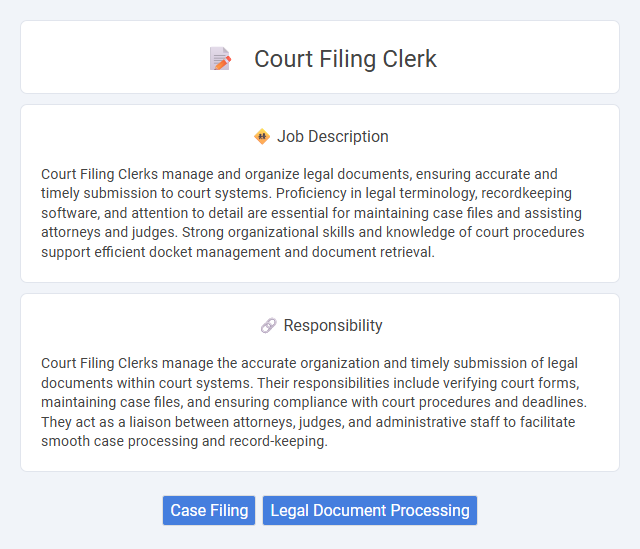
Court Filing Clerks manage and organize legal documents, ensuring accurate and timely submission to court systems. Proficiency in legal terminology, recordkeeping software, and attention to detail are essential for maintaining case files and assisting attorneys and judges. Strong organizational skills and knowledge of court procedures support efficient docket management and document retrieval.
Individuals with strong organizational skills and attention to detail are likely to thrive as Court Filing Clerks, as the role demands precise management of legal documents. Those who prefer structured tasks and routine environments may find the position suitable, while people who struggle with repetitive activities or tight deadlines might face challenges. Adaptability and the ability to maintain confidentiality could also influence one's success in this role.
Qualification
A Court Filing Clerk must possess strong organizational skills and attention to detail, typically requiring a high school diploma or equivalent, with some positions favoring associate degrees in legal studies or paralegal certification. Proficiency in legal terminology, document preparation, and electronic filing systems is essential to ensure accurate handling of court documents. Experience with case management software and knowledge of court procedures significantly enhance job performance and eligibility.
Responsibility
Court Filing Clerks manage the accurate organization and timely submission of legal documents within court systems. Their responsibilities include verifying court forms, maintaining case files, and ensuring compliance with court procedures and deadlines. They act as a liaison between attorneys, judges, and administrative staff to facilitate smooth case processing and record-keeping.
Benefit
A Court Filing Clerk likely experiences benefits such as stable employment and access to government-related job perks. Opportunities for skill development in legal documentation and administrative processes probably contribute to career growth. Employees in this role may also enjoy comprehensive health benefits and retirement plans common in public sector positions.
Challenge
Court filing clerks likely face challenges related to managing a high volume of legal documents accurately and efficiently, which requires strong organizational skills and attention to detail. The job may also involve navigating complex court procedures and deadlines, increasing the probability of encountering stressful situations. Adapting to evolving legal technologies and maintaining confidentiality could present ongoing difficulties in this role.
Career Advancement
Court Filing Clerks can advance their careers by gaining expertise in legal documentation management and court procedures, which positions them for roles such as Legal Assistants or Court Clerks. Developing proficiency in electronic filing systems and case management software enhances opportunities for promotion and specialized administrative roles within the judicial system. Pursuing certifications like Certified Legal Professional (CLA) supports career growth and increases employment prospects in the legal field.
Key Terms
Case Filing
A Court Filing Clerk expertly manages the organization and submission of legal documents, ensuring accurate and timely case filing within court systems. Proficiency in electronic filing systems (e-filing) and a thorough understanding of court procedures are essential for maintaining compliance and facilitating efficient case processing. Attention to detail and the ability to track case statuses significantly support judicial workflows and case management.
Legal Document Processing
Court Filing Clerks play a crucial role in managing legal document processing by accurately filing, organizing, and verifying court records and case files. They ensure that all legal documents comply with court rules and deadlines, facilitating efficient case management and accessibility for judges, attorneys, and other court personnel. Proficiency in legal terminology, document indexing, and electronic filing systems enhances their ability to maintain the integrity and confidentiality of sensitive court information.
 kuljobs.com
kuljobs.com